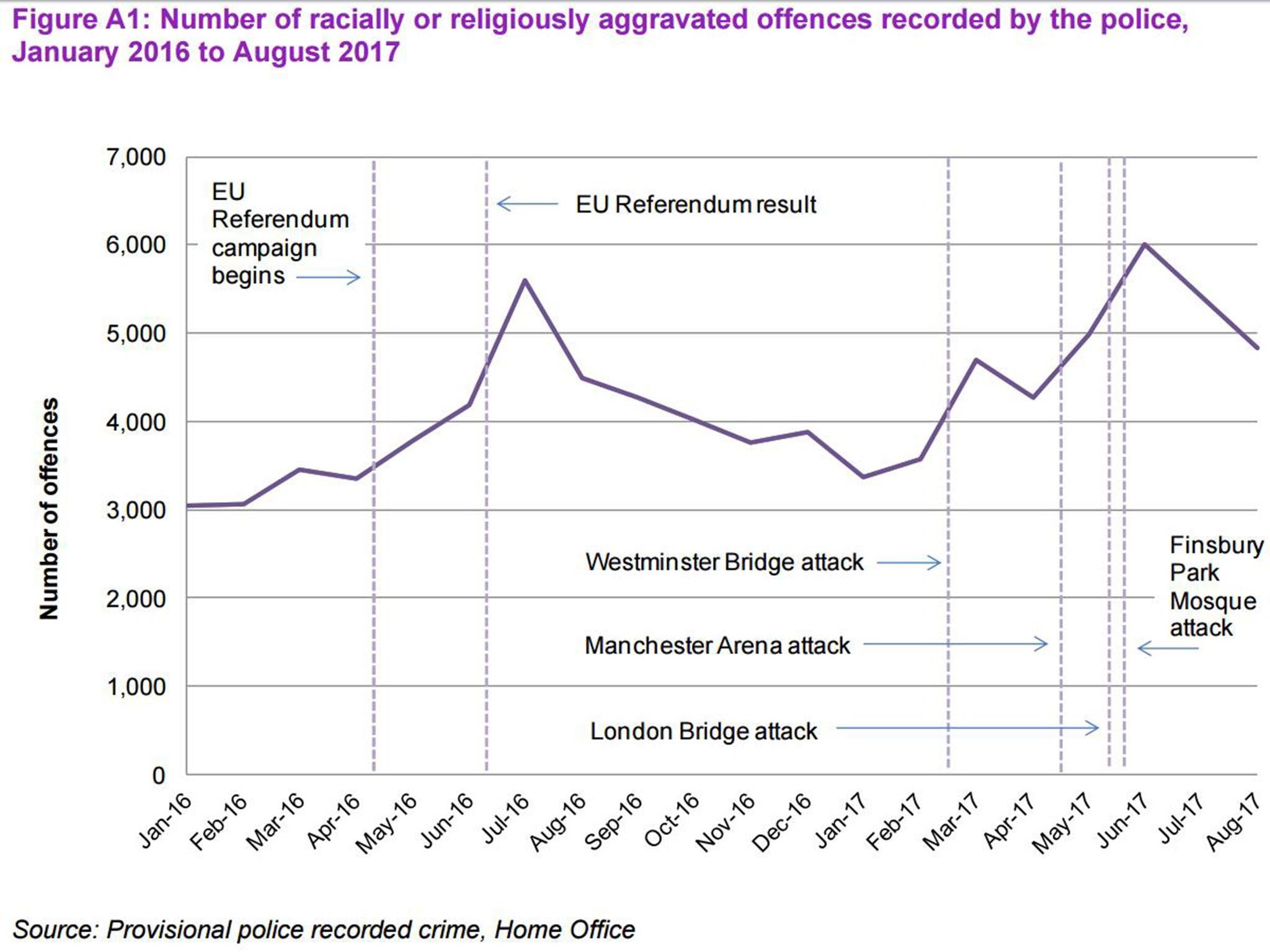Hostility to men could become hate crime under government plans
Misogyny and misandry to both be considered by officials who say they are 'not prioritising one area over another'
Crimes motivated by hostility towards women and men could be brought under hate crime laws after a review, the government has announced.
The Law Commission is to identify any gaps in current offences, look at how to make them more effective and “consider if there should be additional protected characteristics, such as misogyny and age”.
A spokesperson for the Law Commission told The Independent both misogyny and misandry would be considered and that it was “not prioritising one area over another”.
The review is part of a raft of measures announced during national hate crime awareness week, which aims to tackle rising reports of Islamophobic and antisemitic incidents.
Taxi drivers and door staff will be given guidance on spotting the offences and the government is launching a public awareness campaign and new training for police, and giving £1.5m to groups fighting prejudice among young people.
The Home Office is extending a scheme to increase security at places of worship deemed vulnerable to attack, including mosques, churches, Sikh gurdwaras and Hindu temples.
Sajid Javid, the home secretary, said: “Hate crime goes directly against the long-standing British values of unity, tolerance and mutual respect – and I am committed to stamping this sickening behaviour out.
“Our refreshed action plan sets out how we will tackle the root causes of prejudice and racism, support hate crime victims and ensure offenders face the full force of the law.”
Prosecutors currently class offences including assaults, vandalism and harassment as hate crimes if they are motivated by race, religion, gender identity, sexuality or disability.

Some police forces also log other types of hostility under hate crime, including reports of misogyny and incidents where victims were targeted because of their age or membership of an “alternative subculture”, such as goths.
Laws permit courts to hand down longer sentences to anyone found to have committed a hate-based crime, and to those in a “position of authority” or with influence over large numbers of people.
The Law Commission’s brief includes considering whether crimes motivated by hatred “based on sex and gender characteristics, or hatred of older people or other potential protected characteristics, should be hate crimes”.
The independent body will also consider extending laws on “inciting racial hatred”, and said any recommendations will comply with human rights obligations and freedom of expression.
Professor David Ormerod QC, the law commissioner, said: “We are pleased to have this opportunity to identify more effective ways of tackling hate crime in all its forms.”
The review comes after police recorded a spike in racially and religiously motivated hate crimes following the Brexit referendum result and last year’s terror attacks in London and Manchester.
There were 80,393 hate crimes recorded by police in England and Wales in 2016-17, an increase of almost a third on the previous year. The figures for 2017-18 will be released on Tuesday morning.
The government’s action plan said there has been a “welcome increase” in reporting, reflecting improved identification of hate crime by police, a willingness of victims to come forward and an improvement in crime recording.
But the increase is also thought to reflect a rise in hate crime linked to events, the document says, adding: “We continue to see a gap between the occurrence of, and reporting of, hate crime.”
The blueprint includes steps designed to ensure taxi and private hire vehicle drivers identify and report offences witnessed during the nighttime economy.
Advice will be included in the Department for Transport’s best practice guidance on taxi and private hire vehicle licensing, which is scheduled to be updated in 2019 and which will be considered for adoption by all 293 licensing authorities in England.
New guidance for door supervisors sets out how they can ensure transgender people can have a safe and enjoyable time in pubs, clubs, festivals and events.

The government has pledged to work to challenge the attitudes underpinning the attacks, including by supplying £1.5m of new funding for programmes working in schools and with young people.
A scheme to increase security at places of worship is also being extended after being launched in the wake of the Finsbury Park terror attack, which saw a man plough a van into Muslims leaving two mosques during Ramadan.
A further 45 places of worship – 22 mosques, 12 Sikh gurdwaras, nine churches and two Hindu temples – will receive nearly £800,000 for improvements.
Synagogues are covered under a separate scheme administered by the Community Security Trust.
Lord Bourne, the minister for faith, said: “Britain is a proudly tolerant nation, where everyone has the right to live according to their beliefs. Despite this, in recent years we have seen increased reports of religiously motivated hate crime, intolerance and prejudice.
“The publication of today’s updated plan reaffirms this government’s belief that there can never be an excuse for hatred towards anyone. Wherever we find it, we will oppose it and challenge it.”
Baroness Williams, the minister for countering extremism, said the scheme aimed to provide reassurance to communities.
“There are pockets of people who attempt to intimidate religious communities through violence and abuse just because of their faith,” she said.
The Crown Prosecution Service plans to update materials for schools to teach pupils about hate crime, and the government says it is working with disabled people and LGBT+ groups.
Bookmark popover
Removed from bookmarks